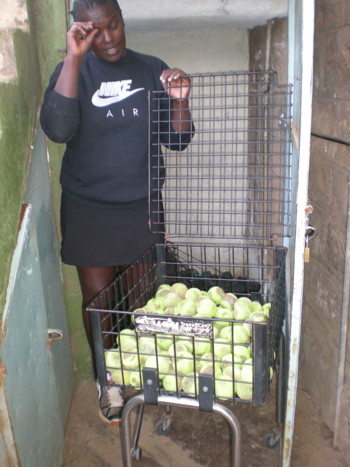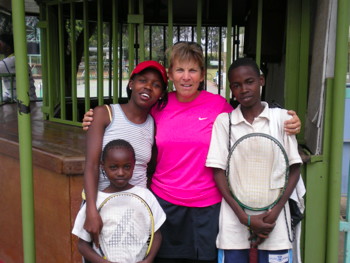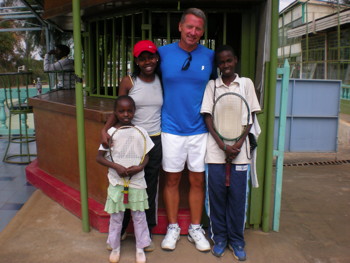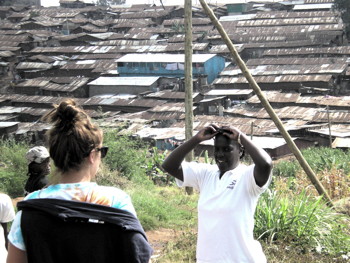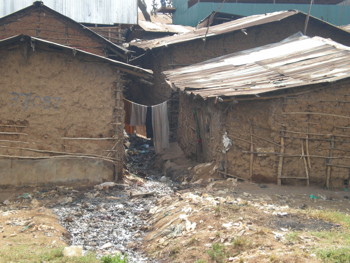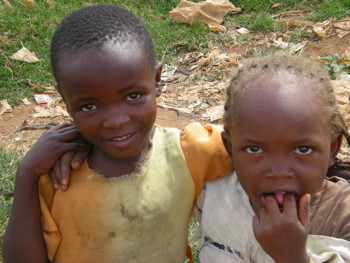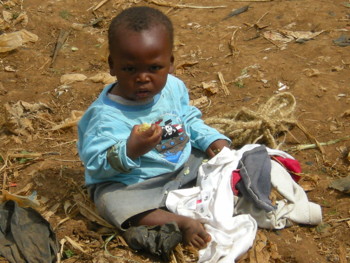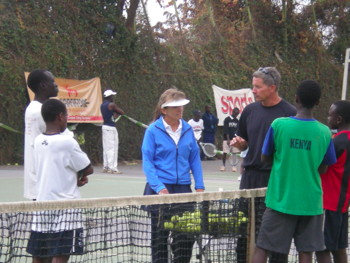February 2011 Article Wild Cards Archives:
Tennis Server
|

 |
Liz Odera: Saving Lives Through Tennis By Greg Moran
Kibera is located in Kenya, 3 miles southwest of Nairobi. It's important to tell you this because you won't find this small town on any maps -- the Kenyan government doesn't acknowledge its existence.
Born in a middle class community in Kenya, Liz Odera was the fourth of Zachary and Idah Okongo's nine children. Both teachers, the Okongos instilled in their children a love of learning and Liz's early years were spent in relative comfort. She even began to play tennis at the age of nine when a neighbor gave her an old racket and taught her the basics. Life changed in 1973 when, after a series of bad decisions, Zachary bankrupted the family. Liz remembers "the auctioneers coming to our house and taking everything we had." The family was then banned from the community and forced to live in the bush. With everything gone and having to trap animals to eat, the family faced another "challenge," as Liz calls it, when Zachary simply up and left. "I think he woke up one morning, found too many mouths to feed, panicked and abandoned us." In Africa this is an all-too familiar scenario. Children are often left with the women who, though usually financially limited, are expected by society to take responsibility for childcare and education. "We were a family under tremendous pressure but my mother kept us together," says Liz. "She was tough but tender. I like to say she ruled the family with an iron fist blanketed by a soft, velvet glove." Liz found refuge in tennis. "With no courts available, I'd hit balls against any wall I could find and create special games to hone my strokes. Plus, our family circumstances toughened me mentally and I learned to compete by playing soccer in the street with the local boys." Unable to afford the fees, it would be two years before Liz or her siblings would again set foot in school. Eventually, she and her mother got jobs at a chicken farm and the money they earned, along with sponsors and government loans, allowed the children to resume their education. "Through our determination, creativity and ability to work hard as well as the generosity of others, we survived." Not only survived, thrived. Apart from an older son who became sick and died during these times, all of Idah Okongo's children completed school and moved on to successful careers: a political scientist, a lawyer, a dentist, three teachers, one immunologist, one journalist and one university lecturer. Back in school, Liz returned to the tennis court and, for the first time, was able to learn the game from a true coach. She became one of the greatest tennis players Kenya has ever produced, winning titles throughout Africa and competing internationally before lack of funds forced her to retire from competitive play. With her playing days behind her, Liz returned to academics, earning degrees in sports science, immunology, parasitology and education. She also married architect Jim Odera and began her family. Though passionate about tennis and education, Liz found her true calling helping children. She dreamed of creating an environment where underprivileged children could receive an education and develop athletic talent in the hope of achieving a better life. "Having come back after losing everything inspired me," she says. "Plus, tennis had brought so much to my life that I wanted to provide similar opportunities for others." Though her concept (Sports + Education = Success) was not unique, the challenges she faced were; the first being to find and pay for land on which to build her dream academy. She eventually located a piece of property outside of Nairobi that was available and affordable, though not particularly desirable. "It was a swamp and an open dumpsite," she recalls. "Jim thought I was nuts. The water table was very near the surface and the sewer system wasn't working particularly well, so no one ever thought it could be habitable in any way." Using her considerable persuasive talents, Liz convinced Jim it could work. "Being an architect, he had the technical skills to design and create the physical academy, while I had the training and passion to transform the children." The Oderas used their savings to buy the land and in 1992 christened their new endeavor "The Sadili Oval Tennis Academy." "Sadili" being a Kiswahili word meaning "fit and healthy," and "Oval" as it described the shape of the property. "For children to succeed in life, tennis is not enough," says Liz. They must also develop their minds." To that end, Sadili Oval formed an alliance with the nearby Malezi School, which offered education for children from pre-school up through high school. With construction underway, Liz was eager for students and drawn to the children of nearby Kibera. Her process then remains the same today. "We reach out by setting up physical education and life skills sessions within the slum and invite the children to participate in our activities: tree planting, medical camps, malaria and HIV-AIDS education. Then, we give them a taste of tennis through mini-tennis sessions we run at four different sites within Kibera. The children's introduction to tennis is bare bones: placed in pairs, the "court" they stand on is, in reality, an uneven mound of dirt. There are no lines and there is no net. One child holds a hand-made "tennis racket" that more resembles an oversized pong-pong paddle, the other a tennis ball worn down to its rubber soul. The first child tosses the ball, his partner taps it back and the game begins: toss, tap, catch. They begin in stoic silence yet as the ball travels back and forth over an imaginary net, their eyes soon begin to shine, defenses evaporate and the laughter begins. It doesn't matter whether the game is played at a country club in Malibu or a mound of dirt in Kenya: tennis is tennis and kids are kids. During a recent visit to Kibera, Serena Williams joined the children in a game of "toss, tap, catch" and called it "the most meaningful tennis of my life." Once the kids are introduced to tennis, the next step is to move them to Sadili Oval where they can begin more formal education and tennis training. The children understand that the opportunity to come to Sadili is a true chance at a better life and everyone wants to be chosen. Unfortunately, Liz lacks the funds to bring them all so she must choose those she feels have the most potential for success. It is, she says "an an incredibly painful process." "When choosing which children to bring to Sadili, we initially look for passion: that fire within that you can see in a child's eyes. Then, as we believe that education is the key to escaping poverty, the children we accept must be willing to study. Finally, they have to understand that the privilege of playing tennis and receiving an education carries a responsibility. They must be willing to become a leader for their community and this begins with learning how to care for themselves, their family and their home." The children Liz selects are largely illiterate, undernourished and baring the emotional scars of their environment. But they are eager. "These kids come from virtually nothing so they're very hungry to learn and their focus is laser-like. With that attitude, we can definitely bring out the best in them on and off the tennis court." A typical day for the children begins with a 30-60 minute walk from Kibera. Arriving at Sadili Oval, they're given clothing, soap and toothbrushes. "We get right to work teaching them hygiene and personal grooming," says Liz. "Before long, you can't distinguish the children that have come from Kibera and those from any other area." The morning tennis session is from 6:10 a.m. to 7.30 a.m and the on court situation, to put it kindly, is difficult. An average American tennis class has roughly a 4-1 instructor/student ratio and several hundred tennis balls with which to practice. Classes at Sadili Oval average between 10-15 students per court/instructor and the players train with 50-60 tennis balls that have lost virtually all of their felt covering. The academy's five concrete courts are in relatively good condition, having been resurfaced a few years ago, thanks to fundraising efforts. Much of Sadili, on and off the court, has come from donations. Windows, chairs, desks, flooring and even door knobs have all been contributed by members of the community. The majority of the equipment in the fitness room is hand-made. After tennis, the kids have breakfast (often their only meal of the day) and attend school. There is an afternoon tennis session which lasts for two hours though the students are expected to spend some of that time studying. In fact, whenever the children come to the courts they must carry a book. As Liz's son Joab, explained to me, "In Africa the opportunity to receive an education is an incredible privilege and cannot be wasted." Like her mother before her, Liz rules her Sadili family with an iron fist wrapped in a velvet glove. She expects hard work and accepts no excuses. Whether it's teaching the kids to play better tennis, speak more clearly or look someone in the eye, Liz constantly and tenderly challenges the children to stretch themselves. Each day, passing children would be introduced to us and asked to "tell our American friends about your goals and dreams." As the children spoke, they sometimes strained to convey their thoughts but they always persevered and their vision was clear: tennis and education would lead to a better life. There is a true culture of support among the children of Sadili Oval in the classroom and on the tennis court: older looks out for younger and big takes care of small. With up to 15 players per court, drilling match-ups can frequently be uneven. It doesn't matter. When a stronger player finds himself hitting against a weaker student, he automatically tones it down, almost moving into the role of teacher, so that the less skilled player can benefit. "Everyone helps everyone," says Liz. "It's part of the program." To nurture this caring culture, Liz has developed a mentoring program where the older children take the younger under their wing to help them through any social or academic problems. "As soon as you become a ranked player, you become a mentor to others." An awareness of the environment is also a significant part in the children's education. "Africa is largely an agricultural community, so if things go wrong with the climate and the land we're literally finished," explains Liz. "We tell the children that the privilege of playing sports comes with responsibility. Look around and say, 'What could I have done better. What could I have recycled instead of thrown away? How can I be as green as possible?' If you ingrain this in a child when they're young, then you'll have people who are responsible about the environment." At the end of the day the kids will often stay at Sadili Oval for more "fun" tennis. Liz often joins in. When darkness forces them off the courts, the nets are taken down and placed in a locked room. If not, they won't be there in the morning. All entrances to Sadili Oval are chained and locked each night. For the walk back to Kibera, Liz provides her kids with solar lamps so they can find their way and read at home. Towards the end of our stay, we were invited to tour Kibera and visit several of the camp's players in their homes. Escorted by Liz (a necessity for reasons of safety) we began the twenty minute walk from Sadii carrying conflicting emotions. First, there was a touch of voyeuristic curiosity. Whenever "biggest" is placed in front of anything, there's a natural pull: "biggest" diamond, "biggest" house and, now, "biggest" slum. We were curious to see Kibera yet had developed relationships with the children that lived there. They were welcoming us into their homes and we wanted to be respectful. Mary Jean Baxley has written that "Hell's Edge Starts at Kibera" and the description is apt. As we enter, hilly roads make balance awkward and the combined smell of body odor, burning garbage and human excrement make breathing through the nose an unpleasant challenge. People fill the streets: some selling raw meat, grilled corn and clothing while others sleep on the ground, next to garbage and livestock. We pass several relieving themselves by the side of the road, oblivious to or uncaring of, our presence. Though there are a few locked, private toilets in Kibera, there is a fee to use them and thus are considered a luxury. Those with money usually spend it on food. With unemployment in Kibera at over 50%, frustration and boredom are constant threats which many seek to alleviate through drugs and alcohol. "Changaa," a cheap, addictive alcoholic brew, is widely available and, at over 50% alcohol, extremely potent. Many start drinking early in the morning, leading to huge problems of violence and crime. We pass several makeshift schools and are told that they're run by the many churches in the community. There are no tables or chairs and books, pencils and paper are in short supply. The children sit on mud floors and learn by memorizing. Approaching the homes, we travel down a dirt path roughly four feet wide and divided by a ditch used for carrying away rainwater and waste. Simple shacks, Kibera homes are made out of mud, plastered over sticks and boards, or from mabati (corrugated iron sheets). The roofs are all made from mabati. At our first stop, Liz calls "Hodi...Hodi" (Swahili for knock knock are you there?) The door opens and Jamin Luvembe, greets us saying "Karibu" (welcome). Jamin's home is typical Kibea: a single room divided into two rooms by a bed sheet with each room measuring roughly 8 feet by 8 feet. Anywhere from twelve to twenty people live in each house. A 15-year-old "lefty" with a big forehand and bigger dreams, Jamin came to Sadili Oval at the age of ten and, two years later, was the top 12 and under player in Africa. His goal is to go to college in the United States and ultimately become a neurosurgeon. "I want to save lives," he tells us as we say goodbye. Contrary to the outside conditions, the inside of Kibera homes are exceptionally clean and the people's spirit incredibly high. Throughout our tour, we were treated with great kindness and respect. Our hosts were genuinely appreciative that we took the time to visit them and were eager to share their lives with us. They possess a tremendous sense of faith and hope for a better life and understand that a better life begins with education and Liz Odera. Over the past 20 years Liz has brought more than 7,000 children through Sadili Ovall's doors. Ninety percent have come from Kibera and seventy percent have completed her program. This means they have achieved the American equivalent of a high school education, a tremendous accomplishment in Africa. There is no doubt that, without Liz Odera, the majority of these children would have faced a life of destitution, drugs and early death in the slum. Sakina Nshiminimana had to pause to compose herself when asked how Liz had impacted her life. "She is my coach, she is my friend and she is my role model. Without a doubt, she saved both my sister and me from certain doom in the slum." During her training at Sadili Oval, Sakina has become one of Africa's top players and hopes to attend an American college next year. Yes, in addition to changing lives, Liz is also turning out winning tennis players. Her son, Joab, is currently a sophomore star on the tennis team at Winston Salem University in North Carolina. Joab initially received a tennis scholarship, but his stellar performance in the classroom earned a full academic scholarship. He hopes to eventually go into forensic medicine. Liz's daughter, Terry, also a top-ranked player, has received several scholarship offers. Aziza Butoyi, East Africa's top-ranked woman says that "Liz has not only improved my tennis but also prepared me to live with people of different cultures and races." Aziza recently learned that she'd been offered a tennis scholarship to Southern Illinois University. Her long term goal is to open a tennis academy "just like Sadili Oval." Twenty years into her dream, Liz Odera is just beginning. Her goal is to move her Sadili program into other communities. "I'd love to be able to create similar systems in areas like Kibera (where she just acquired land to build five tennis courts) and Uganda. Sadili is an example of how successful you can be starting with very little. It's amazing what can be accomplished with a lot of hard work, community support and passion!" The French government recently awarded Liz the French Order of Youth and Sports medal for her "groundbreaking work in development of youth sports in Kenya and her commitment to excellence in education." The award was the latest in a long list of honors she has received. Awards and recognition are "nice," Liz says, because they bring valuable exposure to her program, which helps with fundraising. It is estimated that, in Africa, over 30,000 children die each day. Liz Odera, a champion who has transcended her sport, measures her success not in titles or awards won, but in lives saved. On that scale, she has few peers. To learn more about Liz and her children, and to learn how you can contribute, please visit: The African Child Sport & Education Fund. If you wish to provide a comment to the author of this Wild Cards column, please use this form. Tennis Server will forward the comment to the author.
1998 - 2003 | 2004 - Present
This column is copyrighted by the author, all rights reserved.
|



October 2022 Tennis Anyone: Patterns in Doubles by John Mills. September 2022 Tennis Anyone: Short Court by John Mills. |
 You will join 13,000 other subscribers in receiving news of updates to the Tennis Server along with monthly tennis tips from tennis pro Tom Veneziano.
You will join 13,000 other subscribers in receiving news of updates to the Tennis Server along with monthly tennis tips from tennis pro Tom Veneziano. 
